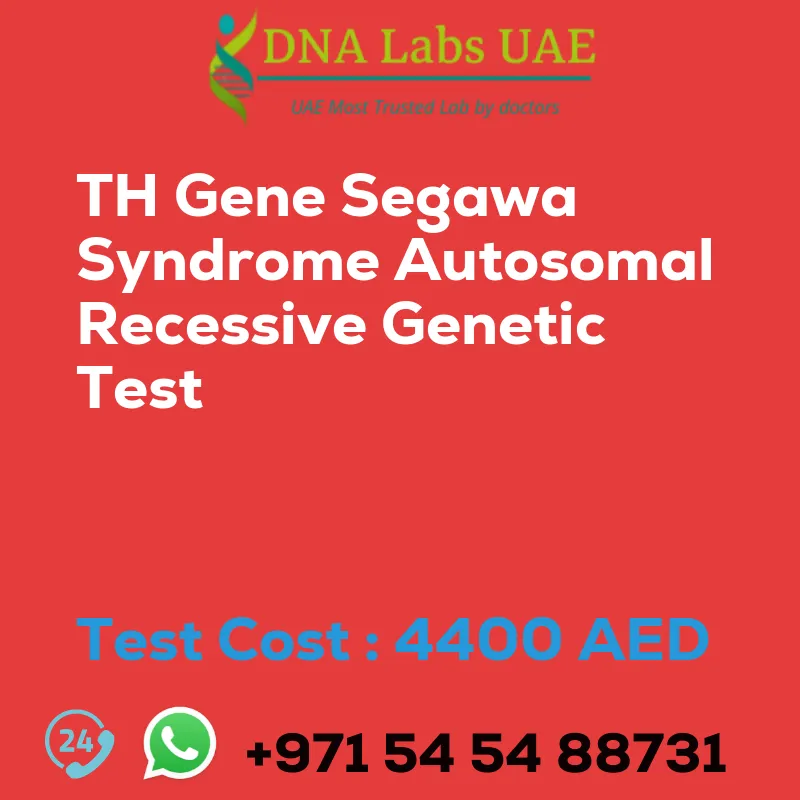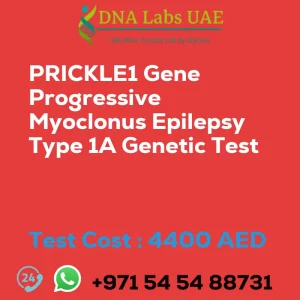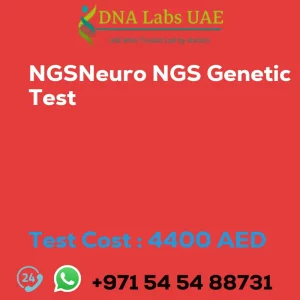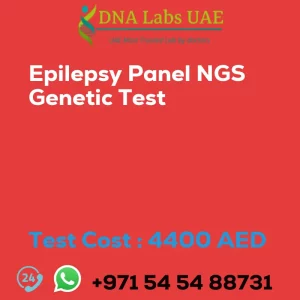TH Gene Segawa Syndrome Autosomal Recessive Genetic Test
Components
Test Name: TH Gene Segawa syndrome autosomal recessive Genetic Test
Price: 4400.0 AED
Sample Condition: Blood or Extracted DNA or One drop Blood on FTA Card
Report Delivery: 3 to 4 Weeks
Method: NGS Technology
Test Type: Neurological Disorders
Doctor: Neurologist
Test Department: Genetics
Pre Test Information
Clinical History of Patient who is going for TH Gene Segawa syndrome, autosomal recessive NGS Genetic DNA Test
A Genetic Counselling session to draw a pedigree chart of family members affected with TH Gene Segawa syndrome, autosomal recessive
Test Details
TH Gene Segawa syndrome, also known as Segawa disease or autosomal recessive dopa-responsive dystonia (DRD), is a rare neurological disorder characterized by progressive dystonia and parkinsonism. It is caused by mutations in the TH gene, which encodes the enzyme tyrosine hydroxylase involved in the production of dopamine.
NGS (Next-Generation Sequencing) genetic testing is a technique used to identify genetic variations or mutations in an individual’s DNA. It allows for the simultaneous analysis of multiple genes, including the TH gene, in a single test. NGS can help diagnose Segawa syndrome by identifying pathogenic variants in the TH gene that may be responsible for the disorder.
Autosomal recessive NGS genetic testing involves sequencing both copies of the TH gene to identify mutations in each allele. In autosomal recessive conditions like Segawa syndrome, individuals must inherit two copies of the mutated gene (one from each parent) to develop the disorder.
The NGS test for Segawa syndrome can be performed on a blood or saliva sample. It involves extracting DNA from the sample and then sequencing the TH gene using NGS technology. The resulting genetic data is analyzed to identify any disease-causing mutations.
Genetic testing for Segawa syndrome can help confirm a clinical diagnosis, guide treatment decisions, and provide information for genetic counseling. It is typically recommended for individuals with suspected Segawa syndrome symptoms or a family history of the condition.
It’s important to note that genetic testing is not always necessary for diagnosing Segawa syndrome, as the disorder can also be diagnosed based on clinical symptoms and response to medication. Genetic testing should be performed and interpreted by a qualified healthcare professional or genetic counselor.
| Test Name | TH Gene Segawa syndrome autosomal recessive Genetic Test |
|---|---|
| Components | |
| Price | 4400.0 AED |
| Sample Condition | Blood or Extracted DNA or One drop Blood on FTA Card o |
| Report Delivery | 3 to 4 Weeks |
| Method | NGS Technology |
| Test type | Neurological Disorders |
| Doctor | Neurologist |
| Test Department: | Genetics |
| Pre Test Information | Clinical History of Patient who is going for TH Gene Segawa syndrome, autosomal recessive NGS Genetic DNA Test A Genetic Counselling session to draw a pedigree chart of family members affected with TH Gene Segawa syndrome, autosomal recessive |
| Test Details |
TH Gene Segawa syndrome, also known as Segawa disease or autosomal recessive dopa-responsive dystonia (DRD), is a rare neurological disorder characterized by progressive dystonia and parkinsonism. It is caused by mutations in the TH gene, which encodes the enzyme tyrosine hydroxylase involved in the production of dopamine. NGS (Next-Generation Sequencing) genetic testing is a technique used to identify genetic variations or mutations in an individual’s DNA. It allows for the simultaneous analysis of multiple genes, including the TH gene, in a single test. NGS can help diagnose Segawa syndrome by identifying pathogenic variants in the TH gene that may be responsible for the disorder. Autosomal recessive NGS genetic testing involves sequencing both copies of the TH gene to identify mutations in each allele. In autosomal recessive conditions like Segawa syndrome, individuals must inherit two copies of the mutated gene (one from each parent) to develop the disorder. The NGS test for Segawa syndrome can be performed on a blood or saliva sample. It involves extracting DNA from the sample and then sequencing the TH gene using NGS technology. The resulting genetic data is analyzed to identify any disease-causing mutations. Genetic testing for Segawa syndrome can help confirm a clinical diagnosis, guide treatment decisions, and provide information for genetic counseling. It is typically recommended for individuals with suspected Segawa syndrome symptoms or a family history of the condition. It’s important to note that genetic testing is not always necessary for diagnosing Segawa syndrome, as the disorder can also be diagnosed based on clinical symptoms and response to medication. Genetic testing should be performed and interpreted by a qualified healthcare professional or genetic counselor. |








